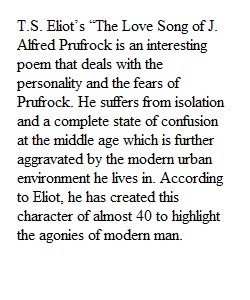


Q Please respond to one of the below questions on Eliot and "The Love Song of J. Alfred Prufrock." When done, please also respond to one fellow student post. A few notes on dramatic monologue and stream of consciousness (these notes do not have to inform your answers this week's questions, but they should help you in understanding the poem either way): “The Love Song of J. Alfred Prufrock” is a dramatic monologue. Dramatic monologues feature a speaker who is clearly a “character” or “persona” (in this case, Prufrock) rather than the author of the poem. The speaker addresses an auditor, attempting to justify or explain his or her behavior or reaction to a particular situation. The reader is thus in the position of “overhearing” the speaker’s self-representation and is implicitly invited to judge the speaker. Usually, the speakers in dramatic monologues reveal more than they intend to about themselves, and the poems often turn on the gap between the speaker’s self-perception and the (often less flattering) conclusions readers are invited to draw about their temperament and character. The question of to whom Prufrock is speaking when he mentions “you and I” has caused much debate about the poem’s status as a dramatic monologue. Some critics believe the “you” addressed is the reader, some that he’s speaking to another person, and some that he’s actually delivering an interior monologue. Stream of consciousness is a type of narration that attempts to represent textually the idiosyncratic thought processes of a character, following what seem like random associations and jumping from idea to idea without clear logical transitions. While stream of consciousness narration is associated primarily with fiction—and presumes that the narrator is not consciously addressing a listener, as Prufrock seems to be doing—many of the hallmarks of this narrative mode are present in this poem. Because “The Love Song of J. Alfred Prufrock” seems to track Prufrock’s thoughts, almost unfiltered, as they pass through his mind, it can be difficult to parse and understand. Many readers find it challenging to interpret what is literally happening in the poem and what is symbolic or metaphorical. Critics disagree about the time frame of the poem. It’s not clear if Prufrock physically travels anywhere or if he pays visits only in his mind or through memory. Of course, the uncertainty also exists about the nature of the “overwhelming question” he can’t bring himself to articulate. 1. How would you describe Prufrock? How does he attempt to portray himself? What might he reveal about himself inadvertently? 2. Reread the poem and pay careful attention to its use of repetition. What words, phrases, and even whole stanzas are repeated? What is the effect?
View Related Questions